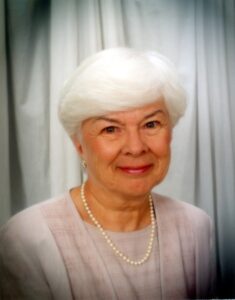E. Ann Sheridan was a longtime professor and dean emerita at the University of Massachusetts Amherst, who made significant contributions to the field of nursing in both of her professional and academic practices. Ann spent much of her life supporting the University of Massachusetts (UMass) Amherst School of Nursing through her advocacy, teaching, alumni relations, and history work.
Ann was born on February 17th, 1934 in Lawrence, Massachusettsto parents Eva C. (Lambart) Sheridan and John J. Sheridan. Ann was raised in Salem, Massachusetts where she spent most of her childhood and was educated at the St. Mary’s Grammar School and the St. James High School. In her senior year of highschool, Ann was the recipient of a diocesan scholarship to the Catherine Laboure School of Nursing in Boston, Massachusetts where she would later graduate from in 1954, having earned a degree in nursing. After earning her degree, Ann began her career as a pediatric nurse, where her lifetime interest in pediatric nursing began. After several years of working as a pediatric staff nurse, Ann attended Boston College and earned a baccalaureate degree in nursing in 1957. Ann worked in many Boston hospitals, including Boston City Hospital during the Polio epidemic, operating “iron lung” respiration machines. During her time here Ann also cared for polio-patient and future mayor of Boston, John Collins who came down with the disease in 1955 and ran for Boston City Council from his hospital room.
Ann later returned to her hometown of Salem, Masssachussetss where she accepted a position as supervisor of the pediatric unit at Salem Hospital, where she built a strong foundation of both nursing and administrative skills. Over the years she worked in many hospitals across the country including Massachusetts, Pennsylvania, and California.
Ann Sheridan went on to earn a master’s of science in nursing from the University of Pennsylvania in 1964 before being hired as an adjunct professor at UMass Amherst’s School of Nursing in 1965, where she would spend the rest of her academic career. Ann would also go on to earn a pediatric nurse practitioner certification from the University of Wisconsin in 1973, and an Ee.D from University of Massachusetts Amherst in 1983. Ann lived through much of the School of Nursings history and growth. When the School of Nursing was merged with the Division of Public Health to create the School of Health Sciences in 1973, Ann was a strong supporter of the School of Nursing’s independence which finally became reality again in 1988. Ann served as Interim Director of the nursing program from 1986-1988. By the time of her retirement in 1998, Ann was instrumental in many committees and activities, such as founding the College of Nursing Alumni Board, helping to establish the Beta Zeta at-Large Chapter of Sigma Theta Tau International Honor Society of Nursing, and by helping document and publish the history of the school of nursing through newspaper articles, commemorative books, and oral histories. Ann was the recipient of the UMass Amherst Chancellor’s Medal in 1997, the Umass Lifetime Achievement Award, and the Living Legend Award from the American Nurses Association, Massachusetts in 2016 among many other recognitions and accolades. Ann spent her retirement in connection with the School of Nursing attending events, working with alumni, creating the Dr. E. Ann Sheridan Scholarship, and supporting the school’s history through researching and writing newspaper articles, commemorative history books, participating in oral history projects, and working with the universities Robert S. Cox Special Collections and Archives on campus, as well as other nursing archives across the country. Ann Sheridan was predeceased by her parents, her partner George L, Balestri, her sisters Alice C. Saben, Claire F. Fosberry, Marion L. Rudolph, her brothers John J. Sheridan Jr. and Thomas J. Sheridan. She was survived by her family of cousins, nieces, and nephews of multiple generations of which she remained close to her whole life. Ann Sheridan passed away on March 26th, 2024 after a short illness.
Ann Sheridan’s dissertation, Contracting and client satisfaction: an inquiry into the delivery of effective nursing care, completed at UMass Amherst in 1983, is available online: https://hdl.handle.net/20.500.14394/14435
Gift of Alyson Saben, Niece of Ann Sheridan


